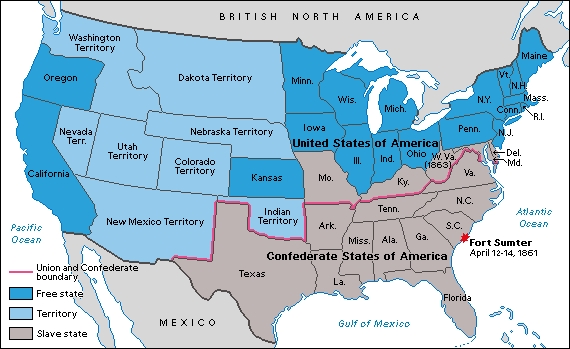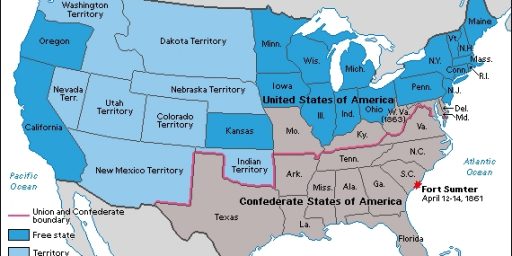Today In History: Alexander Stephens Confirms The Racist Reality Of The Confederacy
As we begin to mark the major events of the Sesquicentennial of the Civil War (the anniversary of the Battle of Fort Sumter, for example, is just about three weeks away), it’s worth noting that today is the 150th anniversary of the day that Alexander Stephens, the first and only Vice-President of the Confederate States of America, delivered his infamous Cornerstone Speech:
Our new government is founded upon exactly the opposite idea; its foundations are laid, its corner- stone rests, upon the great truth that the negro is not equal to the white man; that slavery subordination to the superior race is his natural and normal condition. This, our new government, is the first, in the history of the world, based upon this great physical, philosophical, and moral truth. This truth has been slow in the process of its development, like all other truths in the various departments of science. It has been so even amongst us. Many who hear me, perhaps, can recollect well, that this truth was not generally admitted, even within their day. The errors of the past generation still clung to many as late as twenty years ago. Those at the North, who still cling to these errors, with a zeal above knowledge, we justly denominate fanatics. All fanaticism springs from an aberration of the mind from a defect in reasoning. It is a species of insanity. One of the most striking characteristics of insanity, in many instances, is forming correct conclusions from fancied or erroneous premises; so with the anti-slavery fanatics. Their conclusions are right if their premises were. They assume that the negro is equal, and hence conclude that he is entitled to equal privileges and rights with the white man. If their premises were correct, their conclusions would be logical and just but their premise being wrong, their whole argument fails. I recollect once of having heard a gentleman from one of the northern States, of great power and ability, announce in the House of Representatives, with imposing effect, that we of the South would be compelled, ultimately, to yield upon this subject of slavery, that it was as impossible to war successfully against a principle in politics, as it was in physics or mechanics. That the principle would ultimately prevail. That we, in maintaining slavery as it exists with us, were warring against a principle, a principle founded in nature, the principle of the equality of men. The reply I made to him was, that upon his own grounds, we should, ultimately, succeed, and that he and his associates, in this crusade against our institutions, would ultimately fail. The truth announced, that it was as impossible to war successfully against a principle in politics as it was in physics and mechanics, I admitted; but told him that it was he, and those acting with him, who were warring against a principle. They were attempting to make things equal which the Creator had made unequal.
You can read the whole thing if you wish, or you can share it with the next person you encounter who tries to convince you that the Civil War wasn’t really about slavery, or that there was anything honorable about the Southern Rebellion.






Except that the Stephens quote, if it makes the rebellion purely racist, does so by laying bare that slavery was not. The quote makes it quite clear that Southerners deployed racism to rationalize slavery, not the other way around. Slavery had existed in the Southern states when they were still British colonies without the scientific knowledge that Stephens quite explicitly says his generation now has.
States Rights, States Rights, States Rights…If you keep saying it, it becomes true.
Vast:
I don’t understand what you just said.
What does that mean?
I’m tired, but after several readings, I think Vast is making the chicken-and-egg point that slavery came before racism. Therefore the war is about slavery, not racism.
Again, I’m tired, so apologies to Vast if this was a misinterpretation.
Alexander Stephens was a prototypical liberal.
Arrogantly convinced he and his peers were far more intelligent than Northerners who bitterly clung to their guns and a religion that instructed them that “all men were created equal”, Stephens mocked the deniers of settled science.
Stephens was certain his position was as proven as physics or mechanics, and that the Northerners had a defect in reasoning. As with today’s liberals, his speech implied that if the Northerners somehow were able to gain the intelligence he possessed, they would view things as he did.
@jwest
Have you ever spent a day without going crazy about Liberals and giving a new dimension to the terms “specious argument”?
@Murray
I’d say no. We can play the Bithead Game (named for the ineffable Eric Florak) with jwest . In its original form, the game was played by taking any random headline and seeing how many moves (called a “bith”) it would take you, using the subject of the headline, to end up with something derogatory about Obama . We can slightly alter it for jwest, and see how many biths it takes you, using any random headline, to end up with something dumping on liberals.
Sam,
It’s just not as fun of a game when you play it jwest style. Bithead may be deranged, but there was a certain…eloquence? No, that’s not the word. There was a true attempt to reconcile what was clearly antithetical to Bithead’s point of view, and modify it so that his conservative constructed reality was still safe.
A typical Bithead diatribe would be first A, then B, but if we modify B a bit, we get C and C is clearly liberal’s fault.
I’m guessing Bithead has a modicum more of intelligence than jwest. Jwest’s usually argument goes:
First A, and you know what? I hate liberals, and A is a bad thing, so A is liberals fault.
It’s just sad. At least bithead tried.
Neil,
Since your liberal arrogance won’t allow you to see the nuanced lesson provided in my comment, I’ll try to spell it out for you.
Doug wrote an article that reaffirms his opposition to slavery. He believes deep down that he’s got this subject nailed, and that he’s prepared to take on the pro-slavery contingent as soon as they show up. By doing this, he is demonstrating to his peers that he is the antithesis of a racist and that unicorns weep tears of joy at his goodness.
His views on slavery are formed in a two dimensional, comic book style with clear heroes and villains. By providing a map, he graphically outlines that everyone south of Ohio was evil. In this and other threads, I’ve tried to introduce a more complex theory that slaveholders, in the context of the times, didn’t think of themselves as people committing an atrocity. In fact, as is demonstrated in the Alexander Stephens speech, he shows the arrogance of one who is confident in his scientific knowledge that whites were a superior species than blacks. As such, he would hold dominion over these lesser beings and have a moral obligation to use and care for (what he considered) a form of livestock.
With the benefit of hindsight, all rational people can easily see how wrong Stephens was. My comment sought to show the parallels between someone who believed his superior intellect held the truth at a certain point in history and those who today believe just as strongly that they possess the ultimate truths of science, even in the face of substantial evidence to the contrary.
Actually jwest’s arguments are simpler than Bithead’s. They go like this: A is evil. Therefore A is liberal.
Thus Nazis, Satanists, and the Inquisition are all liberal.
This is called “being stupid.”
I’ve tried to introduce a more complex theory that slaveholders, in the context of the times, didn’t think of themselves as people committing an atrocity
Neither did some Nazis. Who f*cking cares what they thought of themselves?
My comment sought to show the parallels between someone who believed his superior intellect held the truth at a certain point in history and those who today believe just as strongly that they possess the ultimate truths of science, even in the face of substantial evidence to the contrary.
Actually, your comment tried to equate the belief that slavery was right with the belief that anthropogenic climate change is a reality. Because you’re a moron and you think that’s clever and apropos.
@jwest
“He believes deep down that he’s got this subject nailed, and that he’s prepared to take on the pro-slavery contingent as soon as they show up”
From your argument I suppose you are a member of the “pro-slavery contingent”. Well that explains everything.
What I Really Said in the Cornerstone Speech
Alexander Hamilton Stephens
As for my Savanna speech, about which so much has been said and in regard to which I am represented as setting forth “slavery” as the “corner-stone” of the Confederacy, it is proper for me to state that that speech was extemporaneous, the reporter’s notes, which were very imperfect, were hastily corrected by me; and were published without further revision and with several glaring errors. The substance of what I said on slavery was, that on the points under the old Constitution out of which so much discussion, agitation, and strife between the States had arisen, no future contention could arise, as these had been put to rest by clear language. I did not say, nor do I think the reporter represented me as saying, that there was the slightest change in the new Constitution from the old regarding the status of the African race amongst us. (Slavery was without doubt the occasion of secession; out of it rose the breach of compact, for instance, on the part of several Northern States in refusing to comply with Constitutional obligations as to rendition of fugitives from service, a course betraying total disregard for all constitutional barriers and guarantees.)
I admitted that the fathers, both of the North and the South, who framed the old Constitution, while recognizing existing slavery and guaranteeing its continuance under the Constitution so long as the States should severally see fit to tolerate it in their respective limits, were perhaps all opposed to the principle. Jefferson, Madison, Washington, all looked for its early extinction throughout the United States. But on the subject of slavery – so called – (which was with us, or should be, nothing but the proper subordination of the inferior African race to the superior white) great and radical changes had taken place in the realm of thought; many eminent latter-day statesmen, philosophers, and philanthropists held different views from the fathers.
The patriotism of the fathers was not questioned, nor their ability and wisdom, but it devolved on the public men and statesmen of each generation to grapple with and solve the problems of their own times.
The relation of the black to the white race, or the proper status of the coloured population amongst us, was a question now of vastly more importance than when the old Constitution was formed. The order of subordination was nature’s great law; philosophy taught that order as the normal condition of the African amongst European races. Upon this recognized principle of a proper subordination, let it be called slavery or what not, our State institutions were formed and rested. The new Confederation was entered into with this distinct understanding. This principle of the subordination of the inferior to the superior was the “corner-stone” on which it was formed. I used this metaphor merely to illustrate the firm convictions of the framers of the new Constitution that this relation of the black to the white race, which existed in 1787, was not wrong in itself, either morally or politically; that it was in conformity to nature and best for both races. I alluded not to the principles of the new Government on this subject, but to public sentiment in regard to these principles. The status of the African race in the new Constitution was left just where it was in the old; I affirmed and meant to affirm nothing else in this Savannah speech.
My own opinion of slavery, as often expressed, was that if the institution was not the best, or could not be made the best, for both races, looking to the advancement and progress of both, physically and morally, it ought to be abolished. It was far from being what it might and ought to have been. Education was denied. This was wrong. I ever condemned the wrong. Marriage was not recognized. This was a wrong that I condemned. Many things connected with it did not meet my approval but excited my disgust, abhorrence, and detestation. The same I may say of things connected with the best institutions in the best communities in which my lot has been cast. Great improvements were, however, going on in the condition of blacks in the South. Their general physical condition not only as to necessaries but as to comforts was better in my own neighbourhood in 1860, than was that of the whites when I can first recollect, say 1820. Much greater would have been made, I verily believe, but for outside agitation. I have but small doubt that education would have been allowed long ago in Georgia, except for outside pressure which stopped internal reform.
Recollections of Alexander H. Stephens edited by Myrta Lockett Avary
Originally published by Sunny South Publishing Company and Doubleday, Page & Company, 1910
Louisiana State University Press, Baton Rouge, 1998, pages 173-175.
——————————————————————————————————————————-
This man was no racist as you define the term. He dealt compassionately with the issue of race as it presented itself to him in his day. He recognized that all men did so in the same manner and that ideas and popular traditional understanding does, and will change with time, and it is the responsibility of all people to strive to understand it with the purpose of achieving what is best for all races involved, no matter what the tittle of an institution may be as defined by the people of the times. Read what the man actually said. He did not say what everyone quotes him as saying. This Doug Mataconis is very misled and quite foolish in his premise, for there were 5 slave states on the Union side who never set one single slave free until WELL AFTER the war had ended. Lincoln NEVER freed a single negro that he had the power to set free. His own state of Illinois amended its state constitution to PROHIBIT ALL NEGROS, free or otherwise, from coming into the state! That’s THE RACIST REALITY OF THE THE YANKEE UNION HYPOCRITES. Why don’t you just write the truth and stop making up ignorant crap?